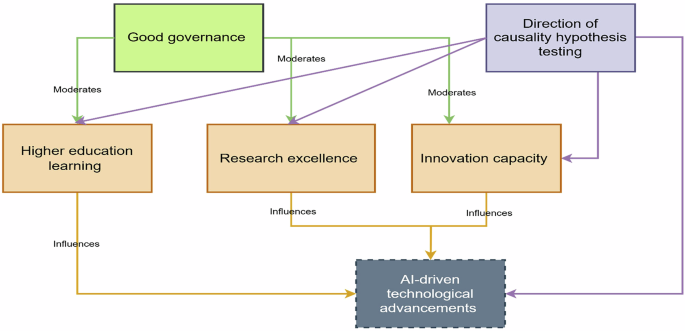The Nordic countries have long been recognized for their robust educational frameworks and innovative capacities. A recent study published in Nature.com underscores the critical role that higher education, research excellence, and innovation play in fostering AI-driven technology within these regions. The research highlights how these elements are not only influential but also interdependent, creating a cycle of advancement in artificial intelligence.
The Interplay of Education and Innovation
In the study, researchers outline the significant impact that higher education and research excellence have on the development of AI technologies. The findings suggest a bidirectional causality, indicating that these elements and AI technology influence and drive each other. This relationship underscores the importance of investing in educational and research infrastructures to sustain AI growth.
"The study reveals a bidirectional causality between higher education, research excellence, and AI-driven technology, suggesting they are determinants of one another," the authors noted.
Governance as a Catalyst
Good governance emerges as a pivotal factor in this dynamic. The study emphasizes that effective governance structures in Nordic countries facilitate the integration and advancement of AI technologies. By providing a stable and supportive environment, governance enables educational institutions and research bodies to thrive, thereby enhancing their contributions to AI development.
This governance model not only supports technological growth but also ensures that ethical considerations and societal impacts are addressed. As AI continues to evolve, the role of governance in maintaining ethical standards and public trust becomes increasingly vital.
Broader Implications
The insights from this study carry broader implications for global AI policy and education strategies. As countries worldwide grapple with the challenges and opportunities presented by AI, the Nordic model offers valuable lessons. By prioritizing education, research excellence, and effective governance, other nations can potentially replicate the success seen in these regions.
However, the study also serves as a cautionary tale. Without the right governance frameworks, the rapid development of AI technologies could outpace ethical and regulatory measures, leading to unforeseen societal impacts. Policymakers must therefore balance innovation with oversight to ensure sustainable and responsible AI growth.
Originally published at https://www.nature.com/articles/s41599-025-05665-3
ResearchWize Editorial Insight
The article underscores the critical interplay between education, research, and governance in driving AI development in Nordic countries. For students and researchers, this analysis is crucial as it highlights the importance of educational frameworks and research excellence in fostering technological advancements. The bidirectional causality between these elements and AI suggests a need for robust academic and research infrastructures to sustain growth.
Good governance is identified as a catalyst, ensuring not only technological progress but also ethical standards and public trust. This is particularly relevant for researchers focusing on the societal impacts of AI, emphasizing the need for governance that balances innovation with ethical oversight.
Globally, the Nordic model offers a blueprint for countries aiming to harness AI's potential responsibly. The article warns of the risks of rapid AI development without proper regulatory frameworks, a crucial consideration for policymakers and researchers alike. The long-term effects of AI on society hinge on this balance, raising questions about how other nations can adapt these lessons to their unique contexts. The systemic risk of neglecting governance could lead to ethical lapses and societal disruptions, making this a pressing issue for ongoing research and policy development.
Looking Ahead
1. Curriculum Overhaul The speed at which AI is evolving demands an educational response that's equally agile. Traditional curriculums are obsolete by the time they hit the classrooms. Institutions must rethink their approaches, pivoting towards dynamic, modular courses that can be updated in real-time. Will our education systems rise to the challenge, or will they crumble under the weight of outdated methodologies?
2. Interdisciplinary Integration AI is not just a field of technology; it's a transformative force across disciplines. Schools must integrate AI literacy into every subject area—from humanities to sciences. Students need to understand AI's implications on society, ethics, and their future careers. Are we preparing students to be mere consumers of AI, or its thoughtful architects?
3. Ethics at the Core With great power comes great responsibility. Embedding ethics into AI education is non-negotiable. We need curricula that force students to grapple with real-world dilemmas AI poses. How can we ensure that tomorrow's innovators prioritize humanity over profit?
4. Hands-On Experience Theory without practice is like a car without wheels. Educational institutions should forge partnerships with tech companies, offering students internships and co-op programs. This blend of academia and industry is crucial for developing practical skills. Will companies step up to play their part in shaping future talent?
5. Educator Empowerment Teachers are the linchpin of this transformation. Yet, many are ill-equipped to teach AI's complexities. Continuous training and support are essential. How can we expect educators to inspire the next generation if they themselves are left behind?
6. Global Collaboration AI knows no borders. International collaboration in educational frameworks can drive a more cohesive understanding and application of AI technologies. Are we ready to embrace a global educational network, or will nationalistic tendencies stifle progress?
7. Policy Alignment Policymakers must ensure that educational reforms align with regulatory frameworks. This ensures that AI developments are both innovative and ethically sound. What happens if regulators fall behind, allowing AI education to drift without oversight?
Originally reported by https://www.nature.com/articles/s41599-025-05665-3.
Related Articles
- Colin Kaepernick makes surprise visit to Portland Public Schools, a new partner with his AI company
- EdTech Industry Report 2025
- CEO Sam Altman announces free premium ChatGPT for college students in the US and Canada throughout May
📌 Take the Next Step with ResearchWize
Want to supercharge your studying with AI? Install the ResearchWize browser extension today and unlock powerful tools for summaries, citations, and research organization.
Not sure yet? Learn more about how ResearchWize helps students succeed.

